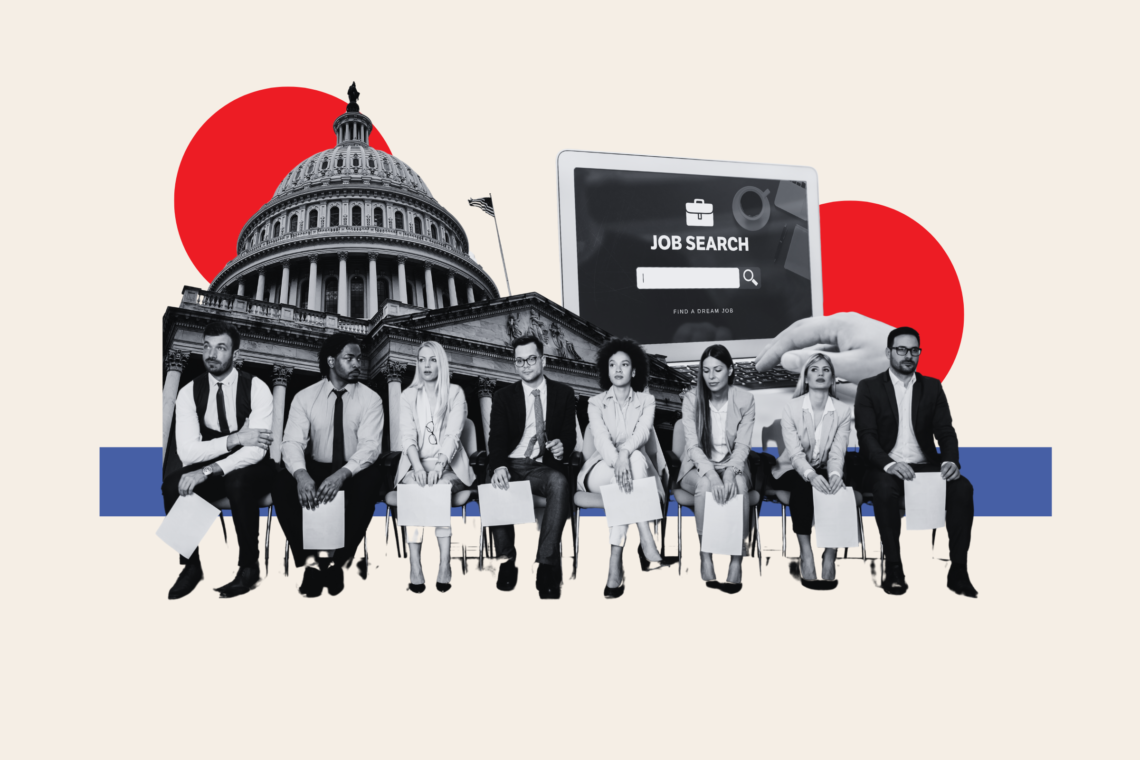Federal workers who have lost their jobs as part of recent mass layoffs recommended by Elon Musk‘s Department of Government Efficiency (DOGE) are being thrown into a “brutally competitive” job market, experts told Newsweek.
“This is not your normal ‘let’s start looking for a job’ situation,” said Amanda Goodall, a self-proclaimed “labor market nerd,” career coach and founder of The Job Chick.
“To be blunt, it’s a brutally competitive job market right now, and that was before we had more than 200,000 federal workers flood the private sector,” she told Newsweek. “Is the job market going to be tough for federal workers? You bet it is.”
Why It Matters
Thousands of federal workers have been fired as part of President Donald Trump‘s administration’s efforts to shrink the “bloated” federal government, as the president described it, though the precise number remains unknown “as plans shift and regulatory and legal challenges to some changes continue to unfold,” Indeed Economist Allison Shrivastava told Newsweek.
Many of those abruptly laid off are now looking for a new job, with Indeed reporting a 50 percent surge in job applications from federal workers between January and February. This dramatic spike in job search activity from former federal employees is likely to continue as DOGE carries on with slashing funds and scrapping contracts across the federal government.
‘Brutal’ Job Market
The federal workforce shrank by 10,000 jobs in February and another 4,000 in March as a result of DOGE’s cuts, according to the latest data released Friday by the Bureau of Labor Statistics. As employees on paid leave or receiving severance are still counted as employed, the number of those axed by Musk’s advisory body could be even higher.
Last month, the country’s unemployment rate edged up again to 4.2 percent, while job openings were down from 7.8 million in February and 8.4 million in March 2024 to 7.6 million.
“Add in the recently laid off federal workers and do the math,” Goodall said.
For Goodall, there are not enough job openings in the market to reabsorb all the federal workers that have been laid off in recent months, “not even close.”
“Ultimately, the overall job market’s ability to absorb cuts will depend largely on the types of jobs workers are looking for and a rebound in employer hiring and confidence,” Shrivastava said.
“Absorbing displaced federal workers and contractors may prove to be a challenge for a job market that is frozen by uncertainty, especially in knowledge-work sectors where employer demand remains low.”
Highly Specialized Workers Could Be Forced To Pivot
According to the company’s study, a majority, 68 percent, of federal workers actively looking for a new job on the Indeed platform in February had at least a bachelor’s degree, compared to just over one-third of all federal workers—showing the impact of DOGE’s cuts on highly educated employees.
“Federal workers and contractors are a highly educated and highly specialized segment of the workforce, predominantly knowledge workers,” Shrivastava said.
The range of jobs highlighted on Indeed’s list of fastest-growing searches “points to the diverse and specialized nature of federal work. It also hints at what roles are already being impacted by DOGE’s cost-cutting efforts,” she said.
“‘Horticulture’ at the top of the list is likely a reflection of displaced USDA workers seeking specialized roles. Searches for ’employee relations’ may represent a segment of the federal workforce whose jobs were or are focused on the kind of diversity, equity & inclusion programs the administration has sought to eliminate. Beyond those specific examples, the list also includes many specialized policy, contract and/or compliance roles common to federal employment.”
These highly specialized workers are likely to have a hard time finding the same roles in the private job market.
“You have all these accountants and lawyers and scientists in the federal workforce who are potentially very useful for the private sector, and those people should find jobs relatively easily,” Christopher Herpfer, assistant professor of finance at the Darden School of Business, University of Virginia, told Newsweek.
“But you have people that are older who have been within the government for 20-30 years and who are very specialized. Those people would find it much harder to integrate into the private labor market.”
Goodall agreed.
“When you talk about highly skilled consultants, specialists—think regulatory wizards, nuclear techs, or policy makers—well show me where that easily plugs into the private sector? It doesn’t. The skill gap is huge,” she added.
Goodall is currently seeing “a total disconnect of job titles and duties” in the U.S. market.
“What may be a director in the federal world is a manager in many private sectors. I have spoken to dozens of federal workers that assume because they were manager or director in their federal role, they will be able to land a VP position, no sweat. Unfortunately that is not how it works,” she said. “So we have a big disconnect on roles, titles and the salaries that go along with them.”
Fundamentally, employers want the exact skillset they deem worthy for their industry, Goodall said.
“If you were a federal manager with compliance skills, sure, you’re probably golden and can look at several different industries within the private sector. But a niche government specialist? They will need to pivot,” she said.
“To become that desirable candidate, federal workers need to really overhaul their resume/personal brand and their lingo and focus on ROI, not public service, and retool decades of mindset overnight. I feel for them because for all the job seekers that are considered ‘desirable’ in the private sector already, the job market is tough and we are seeing the length of the job search increase drastically.
Not A Warm Welcome In The Private Market
With the U.S. economy facing a looming shortage of skilled workers in various fields ranging from health care to engineering, “workers with experience and skills that are in demand will likely be able to be absorbed into the private sector with limited disruption,” Shrivastava said.
“Employers with long-standing and/or difficult-to-fill vacancies, not to mention understaffed state and/or local government agencies that may perform similar functions as their federal counterparts, may yet welcome this influx of candidates,” she added.
“But for those with experience in sectors that have not been growing, like Software Development, IT and Finance, they will be facing an already competitive labor market with fewer openings.”
Goodall is also concerned about workers with “overlapping skill sets in regulatory know-how, project management, database management, auditing, analysis and organizational problem solving.” While these are “all great skills,” she said, “it’s all wrapped in federal methods, and that is not the same hustle and focus in the private sector.”
Discouragingly, she is hearing from some employers who are not interested in hiring former federal employees.
“‘The training alone will be too much. Not worth it,’” she recounted. “I fear the narrative that some select media has portrayed is skewing employers’ thoughts on if they would be good candidates or not.”
The post Fired Federal Workers Flood ‘Brutally Competitive’ Job Market appeared first on Newsweek.




